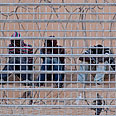
Migrants at border
צילום: רויטרס
Reality dictates rigidity
Op-ed: Poor African migrants seek better life, but Israel has a right to protect its national interests
A man arrives at the Israeli border. The color of his skin is black, he speaks a foreign language and he has kind, pleading eyes. He has no nationalist aspirations, no collective awareness, just the will to survive; to feed his family, like everyone else. If needed, he'll declare that he is seeking work or asylum - a refugee according to international law. It is okay to lie in order to move forward. Words don't cost money.
The dilemma Israel is facing is more complex than fences and image. Several African migrants are stuck between two fences along the Israel-Egypt border, and there are no good solutions. Some solutions, such as the one that was reached on Thursday (Israel allowed entrance to two Eritrean women and a boy), are temporary and can buy the government a few hours or days.
The laws of nature dictate that the poor will seek wealth and that undeveloped countries will 'export' migrants to other, stronger countries. Mexicans still seek gold and opportunities in prosperous America, and Africans seek work in Israel.
Israeli is flourishing in comparison to the rest of the region's nations. The migrants come here because they can. When there are obstacles and fences, they find other ways of reaching their destination. Thousands of people have died while trying to infiltrate into the US, tens of thousands have been deported, and still many manage to illegally cross the border and stay there. The reality dictates rigidity.
The lack of Israeli policy over the years has left the country trapped between the fences. For every migrant who has infiltrated Israel over the past few months there were 10 politicians who spoke of an opportunity that was missed years ago. Agreements with African countries, deportation, training programs and planned fences - everyone identified the problem, and now everyone is blaming everyone else.
But they are having more trouble resolving the painful ethical dilemmas at hand. Migrants' children who grew up in the Israeli reality, asylum seekers, Africans who are stuck between the fences - who is the State of Israel supposed to have mercy on, and who deserves harsh treatment? Should the State allow the poor migrants in at the expense of the residents of south Tel Aviv and other cities, who want personal security in their own neighborhoods? Minister Eli Yishai and the High Court petitioners are still butting heads over these questions.
The State of Israel has an interest in preserving its character, the citizens want to preserve the character of their neighborhoods and the illegal migrants want a better life. A democratic state is entitled to protect its national interests, even at the price of unpleasant images. The African migrants will continue looking for a hole in the fence or a legal loophole. We can be humane and provide food and water to those who are stuck at the border, and we can allow two or three to enter in case of an emergency, but we must maintain the policy of keeping our borders permanently sealed.










